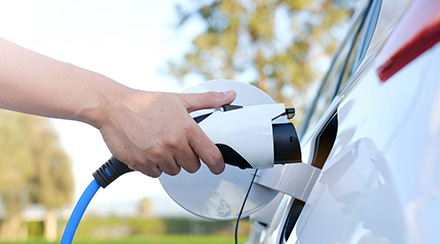Are Electric Cars Cheaper in the Long Run?
The popularity of electric cars continues to grow as manufacturers introduce models that are more affordable and able to drive farther on a single charge. We all know that this is great for the environment, but is it great for your wallet? If you're considering buying an electric vehicle, let’s look into the factors that affect how much you’ll pay.
Do Electric Cars Save Money?

The question of whether or not electric cars can save you money is a complicated one, but fortunately, the U.S. Department of Energy has conducted an exhaustive study to find the answer. Their research takes into consideration all the costs associated with the life of a car, including the purchase price, financing, depreciation, fuel costs, maintenance costs, tax credits and more.
The 2021 study compared vehicles of multiple sizes and found that while the total cost of ownership over 15 years is similar between electric vehicles and their gas-powered counterparts, electric vehicles are slightly cheaper to operate per mile. In the small SUV category, for example, hybrid electric vehicles (HEVs) were the most affordable at 45.08 cents per mile, while gas-powered, spark-ignition vehicles came in close behind at 47.27 cents per mile. Whether these figures will apply to your specific vehicle purchase decision is another question, however. Many of these costs will vary depending on where you live, and where you drive and charge your electric vehicle. Let’s take a closer look at the major cost factors.
Purchase Price
Electric cars generally cost a few thousand dollars more than their gas-powered equivalents. According to a cost comparison study by Car and Driver, the 2020 Mini Cooper Hardtop has a base price of $24,250, compared to $30,750 for the Mini Electric. Similarly, the 2020 Hyundai Kona has a base price of $21,440, while the Hyundai Kona Electric is priced at $38,330. Due to the higher purchase prices of electric vehicles, sales taxes will also be higher, further adding to the upfront cost.
EV Tax Credit
Tax credits can significantly reduce the overall costs of purchasing an electric vehicle, making them closer in net cost to comparable gas-powered cars. The major federal electric car tax credit is the Qualified Plug-In Electric Vehicle Tax Credit, which can be for as much as $7,500. The amount and availability of this tax credit varies depending on the vehicle. Some vehicles are ineligible, because the tax credit is only available for the first 200,000 qualifying vehicles sold in the U.S. by each manufacturer.
There may be other tax credits and incentives available to you, depending on where you live. Use the Department of Energy’s search tool to find out what’s available in your state.
Installing a Home Charging Station
Most electric vehicles can be charged using a standard 120-volt outlet, but this is an inefficient charging method. You’ll only gain about four miles of range per hour this way, compared to about 25 miles of range per hour with a 240-volt outlet, which is normally used for larger appliances.
If you want to be able to charge your vehicle more efficiently at home, you’ll need to have a 240-volt charging station installed by a licensed electrician if you don’t already have one available. Depending on the specifics of the installation and whether it will require upgrading the wiring in your garage or carport, this could cost anywhere from a few hundred dollars to around $3,000. If you’re seriously considering buying an electric car, it’s a good idea to hire an experienced electrician to inspect your home and give you a detailed cost estimate first.
Electricity Costs

Most electric car owners recharge their vehicles at home when possible, resulting in higher utility bills. But in most parts of the country, this increase is more than offset by the savings that come from not buying gasoline. Just like the price of gas, the price of electricity varies by state. So if you live in an area that tends to have above average electricity prices, you may not save as much as a driver in a state with cheaper electricity.
A 2021 Wall St. Journal study compared the electricity and fuel costs of two comparable compact crossover SUVs, the 2021 Toyota RAV4 and the electric Ford Mustang Mach-E. The study examined costs in 15 U.S. cities based on 200 miles of driving per week, and found that at-home charging was cheaper than buying gasoline across the board. In Spokane, WA, where gasoline is expensive but electricity is relatively cheap, the study found an annual savings of $899 by charging an EV at home rather than buying gas. In New York City, where gas and electricity are both relatively expensive, the savings came to $428 – still cheaper, but with savings less than half the size it would be in Spokane.
NRG helps drivers save when charging their electric vehicles at home through the E-Charge Renewable Plan. With this plan, customers enjoy a reduced electricity rate during off-peak hours and fixed energy supply pricing for one year. This plan also makes use of 100 percent renewable energy sources, so you can be confident you’re doing your part for the planet whether you’re driving or charging.
Battery Charging Fees
Even if you do most of your recharging at home, you’ll likely eventually need to make a pit stop at a public EV charging station. The costs for these can vary quite a bit – some are free, while others may charge fees. Some are also exclusive to drivers of electric cars from specific manufacturers. And when it’s time to “fuel up,” you may find that one station charges by the minute while another charges by the kilowatt-hour.
You can search for electric vehicle charging stations throughout the U.S. on the Department of Energy website. Be sure to pay attention to the details for any charging station you plan on visiting so that you know whether you’re eligible, what type of charging equipment they have and how they charge for electricity.
Electric Car Maintenance Costs
Next to fuel costs, this is where most electric vehicles really shine. The 2021 Department of Energy study mentioned above found that the maintenance costs of electric vehicles are about 40 percent lower than those of comparable gas-powered vehicles. This is because electric vehicles do not require routine oil and fluid changes like traditional cars, and they have fewer moving parts overall.
Car Insurance
The relative cost of insuring an electric car compared to a gas-powered vehicle will depend on dozens of factors, including your state and personal driving history. But it’s reasonable to expect insurance to be somewhat more expensive for electric vehicles due to their higher purchase price and overall value. When considering a switch to an electric car, you may want to request price estimates from your insurance carrier for the models you’re thinking about buying.
So, Are Electric Cars Worth It?
If you’re seriously thinking about buying an electric car, it’s worth your time to investigate each of these major cost factors to see how they’ll pan out for you, as well as other costs that may not be so obvious. The specific car model you’re considering, your state, your home, your commute – all these things can make a difference in how much you’ll pay to go electric. But the decision should involve more than just the cost.
Recharging an electric vehicle takes time, and if you’re refueling periodically on long trips, this will require longer stops than a gas-powered vehicle would. Different vehicles have different maximum ranges, so it makes sense to choose a car that will get you through your typical daily commute on a single charge. And because charging at home is so important, drivers who live in multi-unit buildings may find electric vehicles to be a bad fit simply because there’s no practical place to charge them.
But if you find that you have the time, the space and the budget to invest in an electric car, you can take pride in knowing that you’re helping contribute to meaningful change in the health of our environment and planet. By consuming fewer fossil fuels and producing fewer greenhouse gas emissions, you’ll help mitigate the effects of climate change wherever you drive.
Looking for Something Specific?
Select a category to find resources for topics that interest you.
Select Category

Related Articles:

Are Electric Cars Better for the Environment?
Electric cars produce virtually zero emissions while they’re being driven, but charging car batteries and the materials used to make these batteries have their own environmental impact. See how these effects balance out.
Read Article
Are Electric Cars Worth It?
Electric cars are becoming more popular among consumers and car makers for their impressive technology and positive environmental impact. When deciding whether an electric car is right for you, consider these benefits as well as the trade-offs.
Read Article
How Much Does It Cost to Charge an Electric Car?
Electric car owners charge their vehicles and can spend less on gas. So how much electricity does an electric car use, and are the charging costs really less than filling up a tank with gas?
Read ArticleMost Popular Articles

Electric Vehicle Guide
Whether you're deciding if an EV is right for you or setting up a home charger, our Electric Vehicle Guide can help you wherever you are in your EV journey. Learn More.
Are Electric Cars Cheaper in the Long Run?
The popularity of electric cars continues to grow as manufacturers introduce models that are more affordable and able to drive farther on a single charge. We all know that this is great for the environment, but is it great for your wallet? If you're considering buying an electric vehicle, let’s look into the factors that affect how much you’ll pay.
Do Electric Cars Save Money?
The question of whether or not electric cars can save you money is a complicated one, but fortunately, the U.S. Department of Energy has conducted an exhaustive study to find the answer. Their research takes into consideration all the costs associated with the life of a car, including the purchase price, financing, depreciation, fuel costs, maintenance costs, tax credits and more.
The 2021 study compared vehicles of multiple sizes and found that while the total cost of ownership over 15 years is similar between electric vehicles and their gas-powered counterparts, electric vehicles are slightly cheaper to operate per mile. In the small SUV category, for example, hybrid electric vehicles (HEVs) were the most affordable at 45.08 cents per mile, while gas-powered, spark-ignition vehicles came in close behind at 47.27 cents per mile. Whether these figures will apply to your specific vehicle purchase decision is another question, however. Many of these costs will vary depending on where you live, and where you drive and charge your electric vehicle. Let’s take a closer look at the major cost factors.
Purchase Price
Electric cars generally cost a few thousand dollars more than their gas-powered equivalents. According to a cost comparison study by Car and Driver, the 2020 Mini Cooper Hardtop has a base price of $24,250, compared to $30,750 for the Mini Electric. Similarly, the 2020 Hyundai Kona has a base price of $21,440, while the Hyundai Kona Electric is priced at $38,330. Due to the higher purchase prices of electric vehicles, sales taxes will also be higher, further adding to the upfront cost.
EV Tax Credit
Tax credits can significantly reduce the overall costs of purchasing an electric vehicle, making them closer in net cost to comparable gas-powered cars. The major federal electric car tax credit is the Qualified Plug-In Electric Vehicle Tax Credit, which can be for as much as $7,500. The amount and availability of this tax credit varies depending on the vehicle. Some vehicles are ineligible, because the tax credit is only available for the first 200,000 qualifying vehicles sold in the U.S. by each manufacturer.
There may be other tax credits and incentives available to you, depending on where you live. Use the Department of Energy’s search tool to find out what’s available in your state.
Installing a Home Charging Station
Most electric vehicles can be charged using a standard 120-volt outlet, but this is an inefficient charging method. You’ll only gain about four miles of range per hour this way, compared to about 25 miles of range per hour with a 240-volt outlet, which is normally used for larger appliances.
If you want to be able to charge your vehicle more efficiently at home, you’ll need to have a 240-volt charging station installed by a licensed electrician if you don’t already have one available. Depending on the specifics of the installation and whether it will require upgrading the wiring in your garage or carport, this could cost anywhere from a few hundred dollars to around $3,000. If you’re seriously considering buying an electric car, it’s a good idea to hire an experienced electrician to inspect your home and give you a detailed cost estimate first.
Electricity Costs
Most electric car owners recharge their vehicles at home when possible, resulting in higher utility bills. But in most parts of the country, this increase is more than offset by the savings that come from not buying gasoline. Just like the price of gas, the price of electricity varies by state. So if you live in an area that tends to have above average electricity prices, you may not save as much as a driver in a state with cheaper electricity.
A 2021 Wall St. Journal study compared the electricity and fuel costs of two comparable compact crossover SUVs, the 2021 Toyota RAV4 and the electric Ford Mustang Mach-E. The study examined costs in 15 U.S. cities based on 200 miles of driving per week, and found that at-home charging was cheaper than buying gasoline across the board. In Spokane, WA, where gasoline is expensive but electricity is relatively cheap, the study found an annual savings of $899 by charging an EV at home rather than buying gas. In New York City, where gas and electricity are both relatively expensive, the savings came to $428 – still cheaper, but with savings less than half the size it would be in Spokane.
NRG helps drivers save when charging their electric vehicles at home through the E-Charge Renewable Plan. With this plan, customers enjoy a reduced electricity rate during off-peak hours and fixed energy supply pricing for one year. This plan also makes use of 100 percent renewable energy sources, so you can be confident you’re doing your part for the planet whether you’re driving or charging.
Battery Charging Fees
Even if you do most of your recharging at home, you’ll likely eventually need to make a pit stop at a public EV charging station. The costs for these can vary quite a bit – some are free, while others may charge fees. Some are also exclusive to drivers of electric cars from specific manufacturers. And when it’s time to “fuel up,” you may find that one station charges by the minute while another charges by the kilowatt-hour.
You can search for electric vehicle charging stations throughout the U.S. on the Department of Energy website. Be sure to pay attention to the details for any charging station you plan on visiting so that you know whether you’re eligible, what type of charging equipment they have and how they charge for electricity.
Electric Car Maintenance Costs
Next to fuel costs, this is where most electric vehicles really shine. The 2021 Department of Energy study mentioned above found that the maintenance costs of electric vehicles are about 40 percent lower than those of comparable gas-powered vehicles. This is because electric vehicles do not require routine oil and fluid changes like traditional cars, and they have fewer moving parts overall.
Car Insurance
The relative cost of insuring an electric car compared to a gas-powered vehicle will depend on dozens of factors, including your state and personal driving history. But it’s reasonable to expect insurance to be somewhat more expensive for electric vehicles due to their higher purchase price and overall value. When considering a switch to an electric car, you may want to request price estimates from your insurance carrier for the models you’re thinking about buying.
So, Are Electric Cars Worth It?
If you’re seriously thinking about buying an electric car, it’s worth your time to investigate each of these major cost factors to see how they’ll pan out for you, as well as other costs that may not be so obvious. The specific car model you’re considering, your state, your home, your commute – all these things can make a difference in how much you’ll pay to go electric. But the decision should involve more than just the cost.
Recharging an electric vehicle takes time, and if you’re refueling periodically on long trips, this will require longer stops than a gas-powered vehicle would. Different vehicles have different maximum ranges, so it makes sense to choose a car that will get you through your typical daily commute on a single charge. And because charging at home is so important, drivers who live in multi-unit buildings may find electric vehicles to be a bad fit simply because there’s no practical place to charge them.
But if you find that you have the time, the space and the budget to invest in an electric car, you can take pride in knowing that you’re helping contribute to meaningful change in the health of our environment and planet. By consuming fewer fossil fuels and producing fewer greenhouse gas emissions, you’ll help mitigate the effects of climate change wherever you drive.
Looking for Something Specific?
Select a category to find resources for topics that interest you.
Select Category

Related Articles:

Are Electric Cars Better for the Environment?
Electric cars produce virtually zero emissions while they’re being driven, but charging car batteries and the materials used to make these batteries have their own environmental impact. See how these effects balance out.
Read Article
Are Electric Cars Worth It?
Electric cars are becoming more popular among consumers and car makers for their impressive technology and positive environmental impact. When deciding whether an electric car is right for you, consider these benefits as well as the trade-offs.
Read Article
How Much Does It Cost to Charge an Electric Car?
Electric car owners charge their vehicles and can spend less on gas. So how much electricity does an electric car use, and are the charging costs really less than filling up a tank with gas?
Read ArticleMost Popular Articles

Electric Vehicle Guide
Whether you're deciding if an EV is right for you or setting up a home charger, our Electric Vehicle Guide can help you wherever you are in your EV journey. Learn More.







